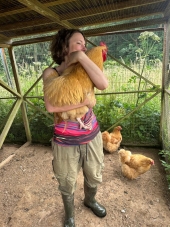
 5
5




Fred Frank V Bur wrote:But I want to know if other vegans are content with being in community with others who are not vegan. Wouldn't all vegan communities be desirable? But maybe my hopes for what sustainable community that way would be does not attract others into discussion for it. I still want to keep trying.
Idle dreamer




A human being should be able to change a diaper, plan an invasion, butcher a hog, conn a ship, design a building, write a sonnet, balance accounts, build a wall, set a bone, comfort the dying, take orders, give orders, cooperate, act alone, solve equations, analyze a new problem, pitch manure, program a computer, cook a tasty meal, fight efficiently, die gallantly. Specialization is for insects.
-Robert A. Heinlein
 4
4




Timothy Markus wrote:The vegans I know consume a lot of almond or soy milk or both. I think that there are frightening issues with current agricultural methods for farming both of these, just like there are with all other 'state of the art' farming for meat, grains, etc. I think you could have a sustainable vegan diet with a nut-based food forest. If you ran an animal rescue you could graze them for their remaining lives, but that's still using the animal. Maybe a food forest abundant enough to let a lot go to wildlife.
Permaculture...picking the lock back to Eden since 1978.
Pics of my Forest Garden
 2
2








Meli Mot wrote:I wanted to respond to the question presented about vegan, permaculture clothing. Apparently nettle stems can be processed like flax to make fiber, and it is warm enough to be traditionally used in the Himalayas:
https://nwyarns.com/blogs/northwest-yarns/know-your-fiber-himalayan-nettle
"Himalayan Nettle fiber has a hollow core, which results in interesting thermal properties. Fibers spun a little loose will create a yarn and fabric that will retain heat extremely well, due to the capture of warm air in that hollow core. Spinning the fibers more tightly will compress the core, creating a fabric that is cooling rather than warming."
I have a big nettle patch on my land and intend to try this later this year, as I am a (fair-to-middling) spinner, crocheter and weaver!
For shoes, i was thinking of wooden ones? Like Dutch clogs, or wooden sandals with socks, like traditional Japanese.




 1
1




Invasive plants are Earth's way of insisting we notice her medicines. Stephen Herrod Buhner
Everyone learns what works by learning what doesn't work. Stephen Herrod Buhner




Meli Mot wrote:Interesting about living without shoes! There are many thorns and prickly things, and some very cold weather, here (below freezing) do you have those conditions too?





Chris Kott wrote:Except that microbes still do the grunt work of breaking down plant-based biomass. How is that different from using worms, or any other livestock?




Christopher Weeks wrote:
Chris Kott wrote:Except that microbes still do the grunt work of breaking down plant-based biomass. How is that different from using worms, or any other livestock?
It's an old comment, but maybe worth addressing. I think there are two primary differences.
The first, and biggest, is that they're wild creatures doing what they want to do and we're just living in synergy with them. Veganic agriculturalists aren't opposed to blue jays flying over their fields and fertilizing things, they're only opposed to owning controlled flocks and using them for that purpose.
The second comes down to the definition of animal. The vegans that I've encountered generally adhere to an almost talismanic distinction between e.g. plants and animals that (I think) stands in for neural sophistication. That is, most of the organisms we first think of when we think of animals -- cows, cats, people, snakes, trout, crows, horses, &c are probably capable of feeling pain and holding the preference to not be eaten. I am skeptical that bugs fit that bill, but I might be wrong and I'd rather err on the side of creating a moral and just world, so maybe I wouldn't eat or otherwise harness them. But I'm convinced that oysters are ethically vegetables and the vegans I've talked to about that powerfully disagree. Anyway, an awful lot of the organisms that people mean when they're talking about soil microbes aren't in the animal kingdom and are therefore fair game for vegans to consume or make use of.




Anne Miller wrote:Meli, one of our members, Joseph goes without shoes.
As a child I went without shoes.
The feet adapt to conditions, especially cold.
Maybe thorny and prickly plants can be avoided until the feet are conditioned?

| I agree. Here's the link: http://stoves2.com |




